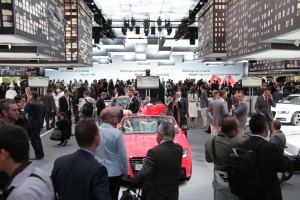
A crowd gathers at the Audi stand at the Frankfurt Motor Show. Automakers are hoping the big event will signal the end of Europe's worst car sales downturn in two decades.
With an estimated 70 all-new or significantly updated products and concept vehicles on display, the auto industry has big hopes for this month’s Frankfurt Motor Show – in itself a good sign considering the downright dour mood at other recent European auto shows.
It’s been a truly awful period for the Continental industry. Hammered by a devastating economic recession that came close to crushing the euro and even breaking up the European Union itself, car sales dipped to their lowest level in two decades during the first months of 2013. But there have been signs of life this summer, particularly in the retail side of the market where not only are more customers returning to showrooms but they’re also spending more to opt up what they buy.
“We’re about to see the end of five years of decline,” predicted Carlos Ghosn, the CEO of the Euro-Asian Renault-Nissan Alliance, during a news conference at the Frankfurt Motor Show.
His assessment was shared by a number of competitors. But while there’s a growing sense of light at the end of the tunnel, some skeptics continue to wonder whether what they’re really seeing is just another brushfire.
While European car sales do show signs of having bottomed out, according to Stephen Odell, the CEO of Ford of Europe, the industry is still operating well below peak levels and will continue to have to take steps to constrain capacity and costs.
Ford, for example, is moving ahead with plans to close its big assembly plant in Ghenk, Belgium, as well as two smaller facilities in Britain. Peugeot, Fiat and Opel are also closing factories – something that would have been all but impossible to achieve prior to the downturn due to strict union agreements and protective national policies.
(Click Here for a complete Frankfurt Motor Show round-up.)
But are those enough? A new study released just in time for the Frankfurt show by restructuring consultants AlixPartners says the industry may not be reaching far enough. It concludes that only 60% of European auto assembly plants will reach the level of capacity utilization – estimated at 70% to 80% — to operate in the black this year. That is up substantially from 2011, when only 40% were operating at profitable levels.
The study suggests that Europe has a full three million units more capacity than it needs right now. And even with the cuts planned by Ford and other makers, about half of that excess will remain.
That prompted Martin Winterkorn, the CEO of Volkswagen CEO, to issue his own dim assessment, suggesting to reporters at the Frankfurt Motor Show that “it’s 10 factories that could be closed.”
(Struggling to “evolve,” Opel’s Monza Concept pushes design envelope. Click Here to see more.)
The European automotive crisis resembles what happened – albeit a few years earlier – in the U.S. But where manufacturers drastically trimmed capacity, especially Detroit makers, during the darkest days of the Great Recession, what European makers have done is “nowhere near the scale of what happened in North America,” concedes Stephen Odell, CEO of Ford of Europe.
But where the U.S. government “actually encouraged” cuts, quite the opposite has been the case in Europe and so, barring another sharp market downturn, Odell concludes that, “If we were going to see large-scale capacity cuts, we would have seen them by now.”
In Ford’s case, Odell contends the long-term savings of the three factory closings scheduled for late next year could ultimately save the maker $500 million annually and put it back in the black in 2015. Meanwhile, General Motors is optimistic its own restructuring – including the closure of a German assembly line – should lead it back into profitability.
(Automakers hope to charge up European market with flood of new battery-based vehicles. Click Herefor the story.)
But don’t expect to see the sort of rapid rebound in Europe the U.S. is experiencing, almost everyone agrees. “We can see the beginning of a turnaround,” said Renault-Nissan CEO Ghosn, “But we still don’t see growth.”
If anything, 2013 will likely end with about a 5% decline from prior-year sales for the European industry, Ghosn cautiously forecasting the numbers will rise perhaps 1.5% in 2014 and only slowly gain momentum beyond that.
The old adage is that, “a rising tide floats all boats.” Perhaps, but Europe’s Great Downturn revealed that more than a few of those corporate boats had large holes in them. Which automakers will be able to take advantage of a sales upturn – however slow – and which will continue to sink remains to be seen.


Car plants in Europe operate much differently (and more fairly) than in the U.S. In the U.S. car makers build new factories whenever they hit on a few popular models or their is a surge in sales. Then when sales drop back to normal they eliminate all the jobs and close the factories because they have over capacity. Thius is wasteful and poor business management.
They can’t get away with such foolishness in Europe because of proper labor laws that require an employer to pay up to 80% of an employees salary if they are laid off. With the costs to build and operate a factory in Europe which can be 2-3x what it costs in the U.S., it simply is poor economics to build excess production capacity.
With the current economic situation in Europe they can expect a very slow recovery just like the overall U.S. economy. The U.S. car makers have been lucky because those with steady, secure incomes who have not been negatively impacted by the ongoing economic recession,are buying new cars. Europe’s auto maker economic recession was delayed a few years because they were expanding rapidly in China. Now that market has slowed so the Euro auto makers sales have slowed.
In the U.S. production workers are just peons to create multi-million dollar CEO salaries and multi-million dollar annual bonuses. CEOs in the U.S. typically receive 3x-10x the compensation that CEOs of equally sized companies in Europe or elsewhere receive. That’s excluding the disgraceful $700 Millon that Tim Cook of Apple received for using Chinese slaves to produce Apple products. U.S. CEOs at Apple, Microsoft, Wal-Mart, K-Mart, Home Depot and a lot more who use Chinese slaves or import 75% of the goods they sell from China, have a lot to be ashamed of. U.S. auto makers aren’t much better as they continue to export U.S. jobs for greater CEO bonuses…